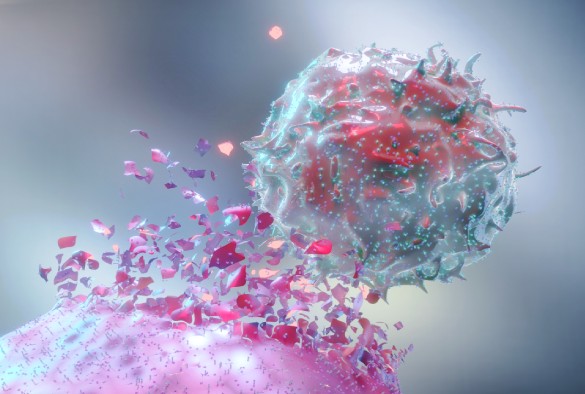
An immunotherapy paper published in Nature Cancer demonstrates that immune cells in skin tissue have circulating counterparts, for years after treatment has been given.
The University of Liverpool’s Professor Christian Ottensmeier was invited to review the paper, Resident and circulating memory T cells persist for years in melanoma patients with durable responses to immunotherapy, from researchers at Geisel School of Medicine at Dartmouth and Rogel Cancer Center, University of Michigan.
Professor Ottensmeier said: “This new study sheds light on the mechanisms that underlie durable response to immunotherapy by evaluating memory T cell responses in long-term melanoma survivors treated with immunotherapy. The study finds that tumour-associated clonotypes (populations of T cells that carry identical T cell receptors) are sustained over years and persist in the skin, with counterparts in the blood.
“This links long-term response and patient survival following immunotherapy to the persistence of a distinct subset of tissue-resident memory (TRM) cells with effector function and shared tumour-associated T cell receptors in vitiligo-affected skin. Given that the skin-resident tumour-associated clonotypes had counterparts in the blood, their findings suggest that skin may serve as a niche of host-wide memory response.
“TRM cells have been associated with prognosis in a wide variety of cancers even in treatment-naïve settings. Future studies will provide comprehensive insights into T cell responses and enable rational choice of immunotherapy at every stage of disease to promote long-term remission.
“A comprehensive understanding of the multifaceted mechanisms, globally as well as at the level of the individual cancer and patient, would guide choice of immunotherapy to promote robust anti-tumour immune responses required for tumour regression and improved patient outcomes.”
Professor Ottensmeier is Chair of Immuno-Oncology at the University of Liverpool and consultant oncologist at The Clatterbridge Cancer Centre NHS Foundation Trust.
The overarching aim of his group’s research is the preclinical development and early phase clinical testing of strategies to induce anti-tumour immune responses in patients.
Supported by a strategic funding award from the National Institutes of Health (NIH), Professor Ottensmeier is collaborating on new studies with NHS colleagues who treat patients with head and neck cancer and lung cancer. This research will use tissue samples from surgical patients to test whether exposure to different viruses affects how the patients’ immune system can recognise and attack cancer cells.
You can read Professor Ottensmeier’s review here, and the full paper here.